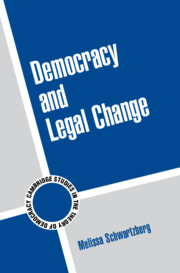Book contents
- Frontmatter
- Contents
- Acknowledgments
- 1 Introduction: Explaining Legal Change and Entrenchment
- 2 Innovation and Democracy: Legal Change in Ancient Athens
- 3 Legislation and Law Reform in Seventeenth-Century England
- 4 Fallibility and Foundations in the U.S. Constitution
- 5 Protecting Democracy and Dignity in Postwar Germany
- 6 Conclusion: Defending Democracy Against Entrenchment
- References
- Index
1 - Introduction: Explaining Legal Change and Entrenchment
Published online by Cambridge University Press: 24 July 2009
- Frontmatter
- Contents
- Acknowledgments
- 1 Introduction: Explaining Legal Change and Entrenchment
- 2 Innovation and Democracy: Legal Change in Ancient Athens
- 3 Legislation and Law Reform in Seventeenth-Century England
- 4 Fallibility and Foundations in the U.S. Constitution
- 5 Protecting Democracy and Dignity in Postwar Germany
- 6 Conclusion: Defending Democracy Against Entrenchment
- References
- Index
Summary
Since ancient Athens, democrats have taken pride in both their power and their proclivity to change their laws. For centuries, political theorists have recognized the distinctively democratic tendency to modify laws, yet this very capacity has given pause to democrats, and they have sought to restrict radically their ability to exercise this authority. As a consequence, democrats have resorted to “entrenchment” – the use of irrevocable laws – as a means of countering their tendency to engage in legal change.
Although today inflexible law is considered a hallmark of democracy, the process of modifying law has a distinguished democratic pedigree of its own. At critical moments for the development of democracy, debates about the appropriate scope and locus of legal change have come to the fore. Political theorists have shaped the ways in which we have conceptualized the nature and the limits of the power to modify law during these disputes. Through retrieving a set of arguments on behalf of the democratic ability to change law, and through analyzing the circumstances in which democracies have restricted this power through the use of entrenchment, we can revisit the question of the relationship between the rule of law and democracy from a variety of fresh vantage points.
The form that legal change has taken, and the logic underlying the modification of law, has of course varied over the centuries. The Athenian embrace of legal change derived from an ideological commitment to pragmatic innovation more broadly.
- Type
- Chapter
- Information
- Democracy and Legal Change , pp. 1 - 30Publisher: Cambridge University PressPrint publication year: 2007

